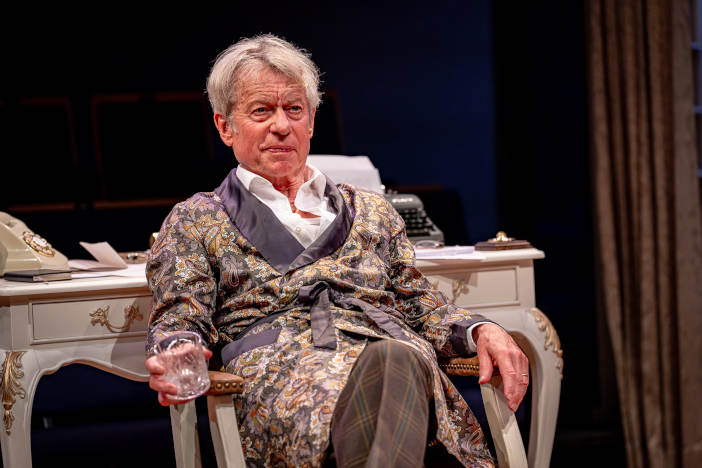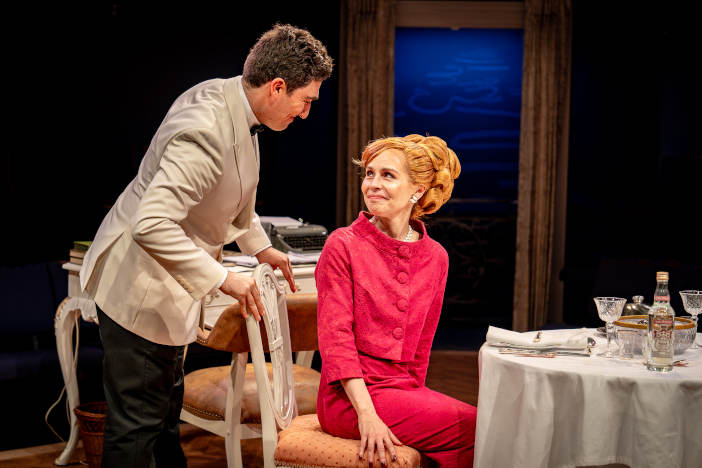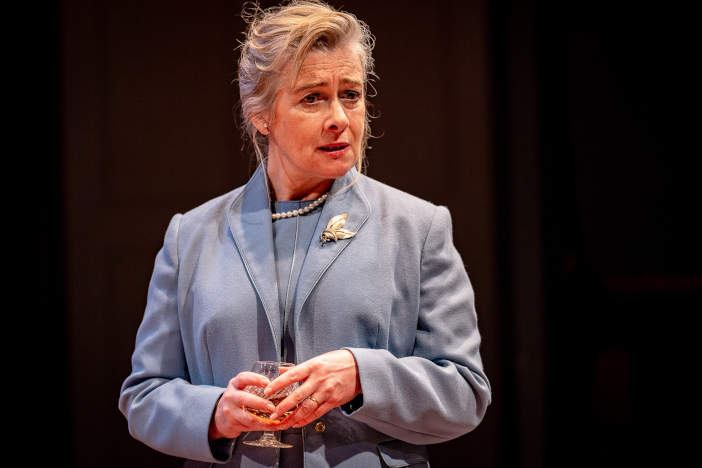There’s only one thing better than a night at the theatre and that’s two nights at the theatre! Or at least, when the production is as flawless as this. Orange Street Theatre are currently at Theatre Royal Bath (until 13th July) with their remarkable revival of Noël Coward’s Suite in Three Keys – a trilogy commencing with the full-length play, Song at Twilight and followed by a double-bill of Shadows of the Evening and Come Into the Garden, Maud.
I last enjoyed A Song at Twilight in 2019, when it was produced by Theatre Royal Bath and starred Simon Callow and Jane Asher but this is the first time that the Suite in Three Keys trio has been presented for a generation. A moving tribute to Coward by Orange Street Theatre, timed to coincide with the 125th anniversary of the writer’s birth and the 50th anniversary of his death, sensitively directed by the company’s award-winning Artistic Director Tom Littler and starring Tara Fitzgerald, Stephen Boxer and Emma Fielding, each of whom shine in their own right and allow their colleagues the space to do likewise. There are laughs aplenty as you’d expect with Coward, but for once he makes sure that you leave the theatre with something to think about.

Each of the three dialogue-heavy tales encompass complicated relationships (usually marital) and are set in the same luxury hotel suite of the Beau Rivage hotel on Lake Geneva in 1965 – allowing the audience a voyeuristic insight into the only-too-human characters, who quickly feel like people you already know. A Song at Twilight reveals the hidden past of famous elderly writer, Sir Hugo Latymer (Stephen Boxer) who faces blackmail at the hands of his ex-lover Carlotta (Tara Fitzgerald) who has intimate letters penned by Hugo in her possession; a premise believed to have been inspired by Somerset Maughan who failed to mention the 30-year liaison with his secretary, Gerald Haxton in his memoirs.
It isn’t so much what we learn about the characters as about Coward himself who reveals himself to be a much finer playwright than he’s often given credit for and intended the work to be his swan song. There always seems to be a revival of Coward’s more famous plays, Hay Fever (1924) and Private Lives (1930) to name a couple, but Suite in Three Keys and it’s brave tackling of subjects like marriage of convenience and closet homosexuality is the work which ought to define him, or at least as much as the frothy comedies that are more familiar to us and in grave danger of being over-played.

Louie Whitemore’s lakeside set design ensures we’re voyeuristically engaged in the unfolding drama from the off, capturing Coward’s talent for making us feel as though we’re looking through a keyhole, always slightly wary of what we’ll discover. If Suite in Three Keys and its hotel room setting puts you in mind of the 1971 Paul Simon film Plaza Suite starring Walter Mathieu, who plays a variety of characters to great and highly amusing effect, you’ll understand Coward’s own displeasure at the film’s close parallels with his own work. Coward, who played Hugo in the first London production in 1966, was surprised by the warm reception by the press to the play which enticed him back onto the stage after decades. “I would like to act once more before I fold my bedraggled wings,” he confessed. Although Coward planned to appear in the trilogy on Broadway, his deteriorating health prevented him and his 1966 London performance proved his last.
Hugo has been married to his secretary Anne (Emma Fielding) for twenty years and, although they appear to have a marriage of convenience, with the calm and controlled Anne (German by birth) doing everything for Hugo, from arranging his appointments to typing his manuscripts and making sure he takes he tablets on time, it’s not clear until much later how much she suspects of her husband’s romantic past. The play opens with Anne preparing to leave Hugo to dine with his former love, Carlotta, who has looked him up out of the blue, fuelling Hugo’s suspicions as to what she might want. Anne, who is going out for the evening and furiously denies feeling any jealousy, has arranged everything with the charming room service waiter Felix (Steffan Rizzi), a carbon copy of Hugo and Carlotta’s very first dinner date; caviar with blinis and vodka followed by fillet steak béarnaise, pink champagne and a chocolate soufflé, all of which Fitzgerald does such as sterling job of consuming that she made me hungry, teasing and evasive with Hugo as to the real purpose of her visit as he helps her to some more caviar.

Hugo appeared to lose his appetite from the moment Carlotta, wearing a vulgar pink pencil dress and white fur wrap, with her red hair done up in a beehive with obvious hairpieces, makes her startling entrance. Fitzgerald is a magnetic Carlotta who calls “a spade a spade” and offers a history of her cosmetic surgeries before being shushed by Hugo. Despite suspecting that she’s here to either blackmail Hugo, or haul him over the coals for breaking her heart, Fitzgerald’s Carlotta is extremely likeable, especially when the stuffy, tweed-suited Hugo accuses her of talking too much or not living up to his exacting standards of etiquette at the dinner table, wheeled in by Felix, who also serenades the audience with 60s hits from a box during the interval.
Don’t miss the chance to see this humorous yet poignant work presented with so much elegance by a stellar production team and cast who adeptly balance Coward’s humour with his far more important message. Perhaps not thought to be relevant in the wake of the legalising of homosexuality in Britain with the Sexual Offences Act of 1967, it now offers a fascinating retrospective into the fears so many gay men lived with at the hand of both the law and society. Coward, himself a well-known homosexual who never married, presents Hugo’s decision to marry and ultimately deceive Anne extremely sympathetically, for the stigma was only beginning to lift when Coward wrote the trilogy, something cleverly illustrated by Hugo’s desperation to protect his “reputation” at any cost. Hugo is a pompous man who has suppressed, nay sacrificed his innermost feelings for the sake of conformity, but never from choice. It isn’t Hugo who should be ashamed, but society. I can’t wait to see what Mr Coward has in store for me tomorrow with the double-bill conclusion to Suite in Three Keys.
Suite in Three Keys: Song at Twilight at Theatre Royal Bath until Saturday 13th July 2024. Running time 2 hours and 30 minutes. For more information and tickets please visit the website. Production images by Steve Gregson.




